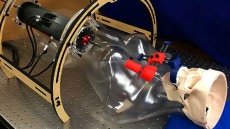Babies born to mothers who used recreational drugs during pregnancy are more likely to have birth defects in the brain, said a study.
The study found no significant links between recreational drug use and any other type of birth defect.
"Our findings suggest a link between brain birth defects and recreational drug use in expectant mothers," said the lead author of the study, Anna David from the University College London.
The study included 213 women whose babies had a type of birth defect with potential links to recreational drug use, 143 women whose babies had a birth defect with no previously reported links to drug use and 161 women whose babies were normally formed.
The researchers found that 77 (14.9 percent) of the women who agreed to take part tested positive for at least one type of recreational drug.
Evidence of drug use was found in a significantly higher proportion of women whose babies were born with brain birth defects (35 percent), compared with women whose babies were normally formed (13 percent).
Brain birth defects included brain anomalies other than spina bifida, such as brain cysts and under-development of the brain. These could have severe consequences and lead to lifelong conditions such as cerebral palsy.
The researchers took hair samples from consenting mothers, which were then tested for evidence of recreational drug use.
The results were published in the journal PLOS ONE.





